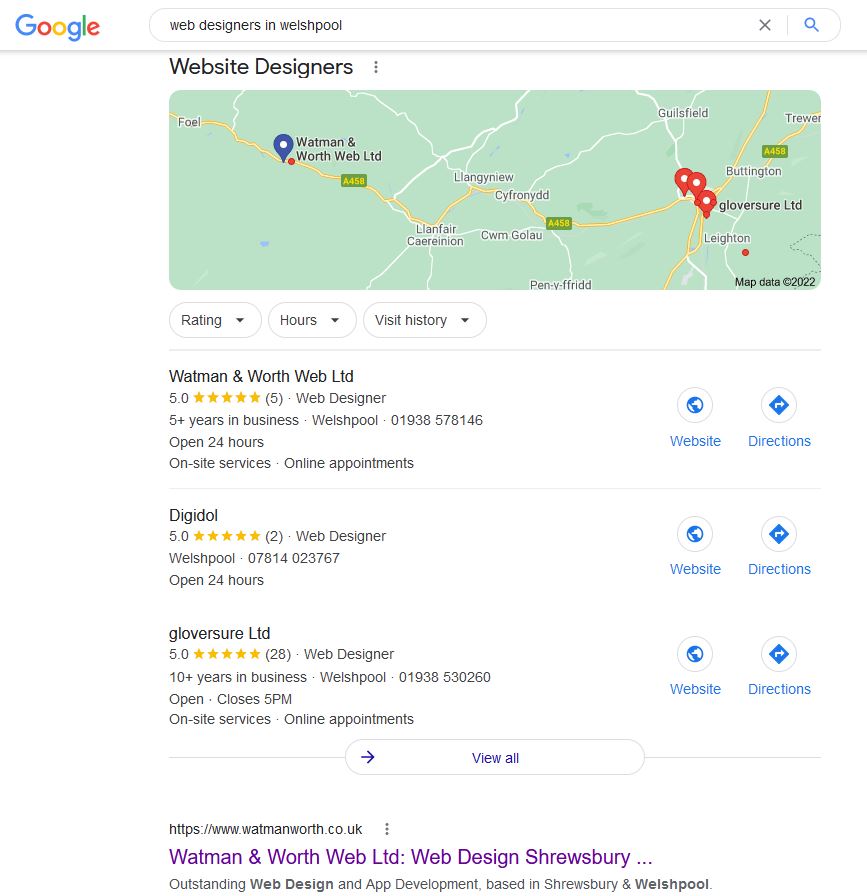Hiring a Web Designer - 5 Easy Steps to find the right developer for you

Let’s face it, hiring a web designer can be a minefield.
As developers ourselves, we constantly hear stories from clients about previous experiences, communication problems, unfinished projects, designers disappearing from the face of the Earth and all manner of questionable hidden costs.
When you are at the stage of hiring a web designer for your project, it’s important to keep a few key points in mind. In this article, we’ll take you through the process of finding the right developer for you and how to ensure you are making an informed decision.
This is covered in 5 simple steps;
- Know what you need from your website
- Find and assess potential Web Designers
- Acquire and compare quotes
- Shortlist and make an informed decision
- Finalise your decision
Step 1: Know what you need from your website
Create a Website Brief
Before you engage with any web design companies, it’s important to have a clear idea of what you need your website to do. A Website Brief will provide a web developer with everything they need to know to accurately quote for your project, and also give them a deeper understanding of your company.
We'll give a few details here, but if you haven't yet created one, you can find a full guide to creating your website brief >>
Introduce your company
Let developers get to know you and your brand
When you hire a web company you will be building a long lasting relationship and they will, effectively become an extension of your team. Give them the opportunity to get to know you, your brand and your business.
Provide an overview and introduction to your company, services, target audience and competitors.
Include your budget for the project
Cost is always an important factor, so have a clear idea of what you are looking to spend on your website.
Remember, your website is not the only cost in your digital marketing. You should factor in any marketing budget that will be dedicated to advertising on social media, SEO and/or 3rd Party Promotions.
In most instances there will be a cost for the design and development of the website, then monthly Hosting & Support changes, much like a mobile phone contract, so be sure to factor in what you can afford monthly.
You may be reluctant to add your budget into your website brief at this stage, or you simply may not have a set idea. It is important to be clear about an estimation of budget to manage expectations on both sides of the potential collaboration.
Some developers may “quote to your budget”, maxing out what you can afford, regardless of whether such a hefty bill is representative of the work. Some will give you the cheapest possible quote to secure the work, leaving you with less than desirable results.
A good web company will use your budget as a guide to provide you with options. There may be ways of doing certain things in your specification that are not exactly as you would like them, but a compromise cost-wise.
We recommend discussing your budget when you have your initial quotes in so that you can explore this further with your potential designers.
Get the quotes for the system you want, then you can discuss what is achievable within your budget.
Time to Launch
Have a clear idea of when you would like to begin your project and when you would like your website to be live by.
A good web design company will need to factor in, not just the design and build time, but live website testing. They will also want to allow time for feedback, design amendments and feature development.
Add your preferred timescales into your website brief.
Website Specification
It’s a great idea to put together a website specification with all of the relevant details.
- Do you need a promotional, brochure style website? Or will you require an Ecommerce system that can take payments online? Do you require a booking system? Think about the facilities your website needs and what you need to offer your users.
- Create a Sitemap with a list of the pages you will require. Each page should serve a purpose, so be sure to structure the flow and intent behind each page.
- If you have an existing website, what are the current issues you are looking to resolve with a new build?
- Create a list of websites that you have seen and what you like about them. Think about features, layout, and design style.
- Do you need additional services such as logo design, branding, photography, or SEO?
Put all of this information into your website specification so that you can present this to web designers when the time comes. This allows them to provide an accurate quotation based on your requirements.
Ask Questions
Your website brief will be provided to the website developers that you make initial contact with. Be sure to outline an initial set of questions that will be valuable for you to compare when you recieve quotes.
You'll need to get answers to questions regarding;
- Project total cost
- Ongoing costs
- Development approach and timescales
- Hosting and support costs
Getting a complete picture will assist you in comparing quotes and identifying any hidden costs that may crop up during or after the development. The answers to these questions will help you to streamline your initial list of potential providers. They will also provide you with any topics that need to be addressed when you speak to your shortlist web companies initially.
Step 2: Find and assess potential Web Designers
Now your search begins!
Once you have everything clear from your end, you can take it to web designers and developers to discuss the project.
So how do we go about actually finding our potential web team? In this section we outline a few ways in which you can find potential developers, and some initial considerations to keep in mind before you contact them.

How to find and search for web designers;
Directly search for web designers in your area via search engines, and check out the offerings of each of the companies.
If you have colleagues, friends, or family that have had a positive experience with their own web developer, be sure to add them to your list. A positive, reliable referral is worth its weight in gold.
Most websites will have a reference to the design company in the footer. If you like the look of a website, check out the company that produced it.
Points to assess when looking at these companies;
Every company should have a portfolio of their work. Take a look over the sites they have produced. Get a feel for how well they work, the design style and the functionality. Do they have experience in the type of website you are looking to develop?
Look for reviews and testimonials from previous clients. What was their experience like when working with the designer? Most companies will have reviews on their website or social media, so be sure to check those out.
You may have more questions, so when you engage with your potential web designers, perhaps ask them for a selection of previous/existing clients. Perhaps even contact a few from their portfolio to get a direct view of those clients’ experiences.
Where are they based? Do they have a registered business address? Check out their website for contact information and location. It's important to have an accessible relationship with your developer, so be sure that they have full contact information and a registered business address.
Do these companies provide and cater for the services you require? For example, if you are launching an ecommerce website, are they able to develop this type of system. Can they work with branding, logo design and promotional materials? Do they develop responsive websites for mobile and tablet devices?
From your initial look at potential developers that fit your criteria, create a shortlist of at least 3 – 5 companies that you would like to consider. Then it's time to contact them.
Step 3: Acquire and compare quotes
From your new shortlist of Web Designers, you should now contact them directly to outline your project requirements and obtain a quote for the work.
We recommend that you review the website brief/specification that you have put together and send this via email to each of your shortlisted companies.
Indicate to them your preferred method of contact and ideal times that they can get in touch with you.
Most companies will contact you for further information or to clarify any points from your brief so that they can put together an accurate quotation for you.
Once each company has provided you with a quote, you should take some time to compare and look at the following points;
Before anything else, the quality of work is our primary consideration. Look at the examples of work provided in the quote and the portfolio that you initially reviewed. Has the web designer considered your brief and provided some relevant examples of work? Have they addressed any points regarding your required functionality and design preferences?
The all important cost! Does this fit in with your budget? If it's outside your budget, is it worth re-evaluating for the quality of work? If one quote is significantly lower, be sure to understand why. If one is significantly higher, what is the reason for this? If you are drawn to one developer, but the cost is outside your range, discuss your budget with them at this stage and decide if there are any compromises or staged development that can help with this.
Be sure to fully understand the payment terms. It should be fair on both sides. You should not be expected to front up all of the cost before you see anything, and likewise the developer should be covered for the time they will be putting in. You should expect to see a deposit payment to show commitment to the project, and a sign-off payment when the website is complete. Larger projects may look to establish staged payment terms. You should also look at any ongoing charges for hosting, support and maintenance.
How does the company work? Do they provide timescales and an outline of the process? How will you provide feedback and input to your project? Will you be able to access and view the progress of the build at each stage of the process? Communication is absolutely essential during the process, so ensure that you have input and that the web designers establish a clear process.
Will you be dealing directly with your designer or will you have an account manager? In our experience it's always much more effective to have direct contact with your designer through out the process rather than a sales representative.
What platform do the company use to build their websites? Will you be able to manage your own content? Is the hosting high speed and secure? Do they host and set up your emails? Do they offer support for when you are managing your website?
The last thing you want is to launch a new website and then each month rack up an hourly bill for every time you call the web designer with a simple question. So be sure to look at the support package, what is included and how it is managed. Also, be sure that the company keep regular back-ups of your website.
Step 4: Shortlist and make an informed decision
Once you have had chance to evaluate the quotations, you should be able to make a shortlist of companies that closely match your project criteria and requirements.
As a point of curtousy, we recommend that you email any companies that did not make your shortlist, thanking them for their time, and where possible a reason why they did not make the cut. It's always helpful for companies moving forward to understand where they can improve.
For the lucky ones that made your shortlist, it's time to get to know them a little better. You should now look at speaking with them directly via telephone, video call or meeting in person. It's now your opportunity to go through any questions you may have, and explore the dynamics of a potential working relationship.
Consider the factors and which are most important for you;
- Do you feel you can have a good relationship with the designers and do they show a good understanding of what you are looking to achieve?
- Are they local to you? If not, are they able to work effectively to fulfill the project remotely?
- Do they communicate well and have they answered all of your questions clearly and concisely?
- Are they able to illustrate expertise and experience relevant to your requirements?
- Have they brought forward any ideas and suggestions which demonstrate their interest and understanding of your comapny?
- Are they able to provide long term support and is there flexibility to further develop and evolve your website when required?
- Are they asking YOU questions? This process is as much for them to learn and explore as it is for you. If they are asking for more information and getting to know you, this is a positive sign that they are engaged and assessing how they will approach your project.
If the proposal has not covered the following points, be sure to discuss these topics with the web company;
- If the quotation exceeds your budget, explore options with payment terms, features, and functionality that will bring the cost to your budget.
- Are there any additional or unlisted costs which will occur?
- If your website is taking payments, have you selected a payment gateway and is your developer able to integrate this within the agreed project quote?
- Have the ongoing costs been addressed? Ask about Hosting, ongoing support and maintainance.
- Where will your website be hosted, is it high speed and secure hosting? Will you have an SSL Certificate on your website?
- How does their support work? Will you have access to telephone, email or chat support? What are the costs and limits involved?
- Fully understand the process when it comes to future developments to your website as you grow. What are the costs involved and does the website platform have the flexibility to grow with you.
- Has the timescale for development and launch been addressed?
- What does the design and build process involve? Will you be able to make revisions and how is your feedback handled?
- What platform will your website be built on? Is it bespoke software or will they be using 3rd party website builders?
- Always ask about SEO! Does the website platform have effective SEO Tools and is it technically optimised for search engines.
- Will the website be fully responsive across mobile and tablet devices?
- Will the website platform have a full Content Management System allowing you to access, update and manage all of your content?
- Are you limited in the number of pages, products or data on your website?
- Will your email be hosted and what are the limits?
- Do you have the ability to host your website with another provider in the future?
Step 5: Finalise your contract
Once you have made you decision, you can deliver the good news to your chosen designer.
Make a final agreement on the cost, payment terms, timescales and development schedule.
Ensure that any changes you have discussed to the initial quote have been reflected in a revised version of the document.
Once you are happy with the final version of the document, your chosen web company will then be able to provide you with the deposit invoice to begin the work. You should double check to ensure it is itemised where relevant and that the payment terms are also included on the invoice.
Once that is processed you will be ready to get to work.
Finally, you can start the exciting process of bringing your vision to the screen.
In summary
Hiring a web designer is an important decision that will have an impact on the success of your online presence.
It's important to have a strong relationship with good communication. Be sure to ask questions about anything that you would like more information on. Always compare costs based on quality and service. Sometimes a lower cost means lower quality. And likewise, sometimes a higher cost means unneccessary and overcomplicated developments.
You want the website that you need, so have open discussions, have reasons and explanations for everything. All costs should be justified in terms of the time and expertise required to achieve your project outcome.
If you are looking to launch a new website and would like to discuss your project, we'd love to chat to you.
Please feel free to get in touch - contact Watman & Worth Web
Blog Categories
Become a guest blogger
Do you have an article to post about Digital Media & Marketing? Maybe Design or Social Media is your passion?
If so we'd love to hear from you.
Looking for a new website?
If you are looking to develop a new website for your business, why not get in touch and have a chat through your project.
We'll provide you with a free quote and website specification to assist with your planning.



















